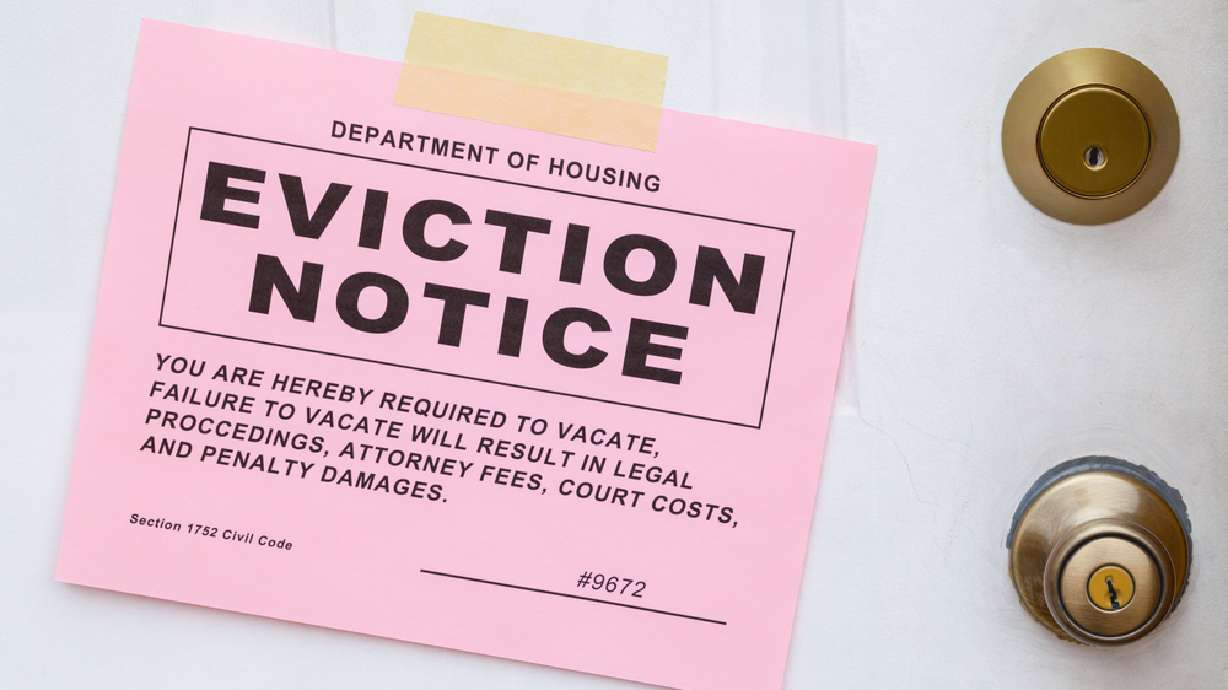Estimated read time: 5-6 minutes
This archived news story is available only for your personal, non-commercial use. Information in the story may be outdated or superseded by additional information. Reading or replaying the story in its archived form does not constitute a republication of the story.
"Eviction imposes substantial harms on affected tenants, and the scale of this damage is enormous; an estimated 3.6 million evictions are filed annually in the United States," Samuel Jacobsen and Aarong Shroyer write for the Office of Policy Development and Research.
Often evictions are preventable and filings are for a small amount of funds. Without legal representation or an understanding of the process, renters are likely to find themselves without housing options.
As more and more people choose to rent as a housing option, understanding how housing evictions work — as well as your options, should a landlord try to evict you — should be part of every renter's move-in checklist.
1. Understand rental agreements and pay your rent
First and foremost, when you're renting property from a landlord, it's important to understand the exact terms and conditions of that rental. Landlords usually communicate this through a formal rental agreement.
"A rental agreement is a legal document between a landlord or property owner and a tenant," says Jacob Kent, a housing attorney with Utah Legal Services. "Make sure you have a written list and clear understanding of all the fees you will be expected to pay, including rent, parking, utilities, water, and internet."
Kent also recommends making sure you know and take photos of the condition of the rental property before you fill out an application, pay any money, or sign any document related to the property. Once you have signed the rental agreement, make sure to keep a copy or take pictures of the document.
The next piece of advice is to always pay your rent on time, including the fees in your lease like utilities. Preventable evictions can occur because of poor communication with your landlord. As a renter, if your income is delayed and you will be unable to pay rent on time, first start with communicating this to your landlord. Get any payment agreement you make with your landlord in writing, a text or email, and signed by you and your landlord.
"Pay your rent on time. Pay your rent on time, including fees. Pay your rent even if the property is in bad condition," Kent says. "If you can't pay your rent, contact Utah Legal Services for advice before your rent is due."
2. Stop an eviction or eviction notice
Failure to pay rent on time isn't the only thing that could lead to your eviction, or removal, from a rental property. According to Utah Legal Services, a landlord could also evict you for the following reasons:
- Not paying late fees or other amounts owed under the lease.
- Not paying for damage you did to the apartment.
- Violating the lease.
- Bad behavior or criminal activity.
- Your lease is up and the landlord gave you notice to move.
"Evictions move very quickly," Kent emphasizes. "An eviction notice typically gives you only three calendar days to respond and leave your rental property. The three days begin the first day after the notice was given to you or posted on your door."
Call Utah Legal Services the moment you know you can't pay your rent. The staff and legal team may be able to help you find a way to avoid an eviction lawsuit.

3. Know about evictions
Contrary to what some may think, a landlord can't simply kick you out of your rental by changing the locks or shutting off the utilities. If your landlord tries any of these things, call the non-emergency line of your local police or sheriff's office. Tell the police that the landlord does not have a court order to evict you.
If you fail to pay the rent after the three-business-day notice to pay or vacate, the landlord will typically file an eviction lawsuit. If you are served with an eviction lawsuit, you must respond in writing within three business days to the district court in which the lawsuit is filed. If you have questions about the type of notice you were served or the terms on the notice, call Utah Legal Services immediately. A member of the legal team at Utah Legal Services can walk you through your options before the three-day window closes.
4. Consider an eviction expungement
An eviction can affect whether or not future landlords will rent to you. In some cases, you may be eligible for an expungement — or a permanent removal — of the eviction from your record. There are three ways to expunge an eviction; through an agreement with your landlord, filing a petition with the court, or waiting three years after the case is dismissed. Utah Legal Services can help you decide if you are eligible and the best way to expunge your record based on your individual situation.
5. Get housing and rent advice
It's always important to remember that you have legal rights as a tenant. If you have questions about a rental property, cannot pay your rent, receive an eviction notice, or are interested in an eviction expungement, contact Utah Legal Services and their housing practice team. You can apply for help online in English and Spanish or call to set up an appointment. Utah Legal Services is a statewide program with offices in Salt Lake City, Provo, Ogden and St. George. Visit utahlegalservices.org for more information.









